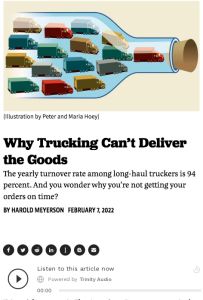Join getAbstract to access the summary!

Join getAbstract to access the summary!
Harold Meyerson
Why Trucking Can’t Deliver the Goods
The yearly turnover rate among long-haul truckers is 94 percent. And you wonder why you’re not getting your orders on time?
The Prospect, 2022
What's inside?
From Jimmy Hoffa to the New Deal, the history of trucking shows how regulation makes or breaks supply chains.
Recommendation
Attempting to explain a particularly broken part of the supply chain, American Prospect editor Harold Meyerson takes a deep dive into the history of trucking in the 20th century. From the politics of the New Deal to the 1960 tensions between Ralph Nader and the Teamsters, he conveys a fascinating history that reveals a lot you likely didn’t know. His compelling insights will intrigue you, particularly if you’re waiting for your new furniture to arrive – by truck, of course.
Summary
About the Author
Harold Meyerson is editor-at-large of The American Prospect. This article appears in its February 2022 special issue, “How We Broke the Supply Chain.”


















Comment on this summary